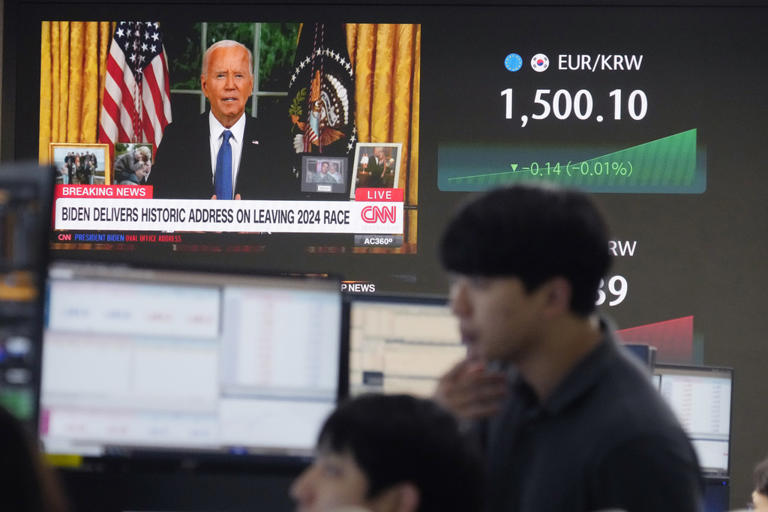Asian stock markets experienced a significant downturn on Thursday morning, with Tokyo’s benchmark Nikkei 225 plunging more than 1,000 points at one point, reflecting widespread investor pessimism following a major decline on Wall Street. The U.S. stock indexes had suffered their worst losses since 2022, driven by disappointing profit reports from major technology companies Tesla and Alphabet, which undermined the momentum that had been fueling enthusiasm around artificial intelligence (AI) technologies.
In early trading, Japan’s Nikkei 225 index fell 2.7%, reaching 38,118.49. Australia’s S&P/ASX 200 saw a 1.1% drop, settling at 7,876.60. South Korea’s Kospi index declined 1.9% to 2,705.41, while Hong Kong’s Hang Seng Index fell by 1.2% to 17,101.45. The Shanghai Composite Index also saw a decrease of 0.8%, ending at 2,879.78. Among the region’s major technology shares, Samsung Electronics saw a 2% drop, Nintendo fell nearly 2%, and Tokyo Electron tumbled nearly 5%.
The broader market sentiment is heavily influenced by expectations for the so-called “Magnificent Seven” tech stocks, which include Alphabet, Amazon, Apple, Meta Platforms, Microsoft, Nvidia, and Tesla. These companies have been pivotal in driving the S&P 500’s record highs this year. The recent disappointing earnings reports from Tesla and Alphabet have heightened concerns about the sustainability of their growth, exacerbating negative sentiment in the markets. Anderson Alves at ActivTrades pointed out that this pessimism was amplified by the underperformance of key tech stocks, noting that the tech sector in Asia could be under substantial pressure as a result.
The strengthening yen has also been a negative factor for Japanese exporters. The yen had recovered from its earlier high of over 160 yen per dollar earlier this month. As a result, major Japanese companies such as Toyota Motor Corp. and Sony Group experienced significant declines in their stock prices, with Toyota falling 2% and Sony sinking 4%.
In currency trading, the U.S. dollar weakened slightly to 152.80 yen from 153.89 yen. The euro remained relatively stable, costing $1.0844 compared to $1.0841 previously.
On Wall Street, the S&P 500 index experienced a sharp decline of 2.3%, marking its fifth drop in the last six days, and closed at 5,427.13. The Dow Jones Industrial Average fell 1.2% to 39,853.87, while the Nasdaq composite dropped 3.6% to 17,342.41. Tesla, in particular, had a severe impact on the market, falling 12.3% after reporting a 45% drop in profit for the spring, which fell short of analysts’ expectations. Tesla’s significant market valuation is not only attributed to its electric vehicles but also to its AI initiatives, such as a proposed robotaxi. UBS analysts led by Joseph Spak have noted that valuing such futuristic initiatives is challenging due to uncertainties regarding their success and time frame.
Alphabet also faced difficulties despite reporting better-than-expected profit and revenue for the latest quarter. The company’s stock dropped 5% as investors grew increasingly impatient with its heavy investments in AI, which have yet to yield substantial returns. Analysts highlighted some weaknesses, such as slower-than-expected growth in YouTube advertising revenue. Additionally, Alphabet’s stock had already surged nearly 50% over the past year, contributing to heightened expectations that may not have been met.
The Russell 2000 index, which tracks smaller stocks, had previously been gaining as Treasury yields eased in anticipation of potential Federal Reserve rate cuts. However, it dropped 2.1% on Wednesday. The market had been buoyed by the expectation that inflation was slowing enough to prompt rate cuts, but mixed data on U.S. business activity dampened these hopes. Preliminary data indicated that manufacturing activity is shrinking, while service sectors are still growing. This created a “Goldilocks” scenario where the economy is not too hot to trigger inflation nor too cold to induce a recession. Chris Williamson, chief business economist at S&P Global Market Intelligence, noted underlying concerns, including uncertainties surrounding the upcoming November elections.
Treasury yields were mixed on Wednesday, with the yield on the 10-year Treasury rising slightly to 4.28% from 4.25% late Tuesday. The market faces the challenge that even if other stocks rise, they must outpace the decline of major tech stocks, which hold significant influence over the indexes. For instance, Nvidia fell 6.8%, making it the largest weight on the S&P 500 index. Given Nvidia’s substantial market value, a 1% move in its stock has a larger impact on the index than similar moves by other companies, except Microsoft or Apple.
In energy markets, benchmark U.S. crude oil lost 36 cents to $77.23 per barrel, while Brent crude, the international standard, fell 37 cents to $81.34 per barrel. The oil market has been influenced by a range of factors, including geopolitical developments and shifts in demand forecasts.
In summary, the significant declines in Asian markets were driven by a combination of disappointing earnings reports from major tech companies, ongoing economic uncertainties in China, and geopolitical tensions. Investors are navigating a complex landscape where technological sector volatility and macroeconomic indicators are shaping market dynamics.
